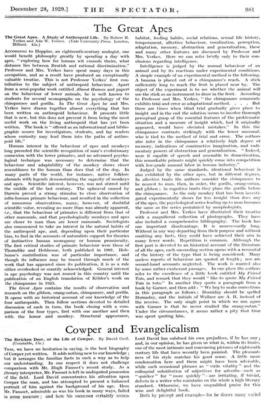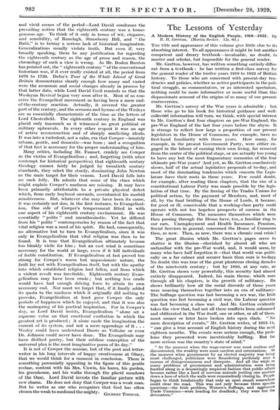Cowper and Evangelicalism
The Stricken Deer, or the Life of Cowper. By David Cecil. (Constable, 15s.)
Tins, we have no hesitation in saying, is the best biography of Cowper yet written. It adds nothing new to our knowledge ; but it arranges the familiar facts in such a way as to help our understanding. In one respect it does not challenge comparison with Mr. Hugh Fausset's recent study. As a literary interpreter, Mr. Fausset is left in undisputed possession of the field. Lord David concentrates his attention upon Cowper the man, and has attempted to present a balanced portrait of him against the background of his age. Here Mr. Fausset, admirable as was his book in many ways, failed
in some measure ; and here his successor certainly scores.
Lord David has subdued his own prejudices, if he has any ; and, in our opinion, he has given us what is, within its limits, one of the most intimate and convincing pictures of eighteenth century life that have recently been painted. The pleasant- ness of his style matches his good sense. A little more condensation here and there might have been advisable, while such occasional phrases as " virile vitality " and the colloquial substitution of adjectives for adverbs—such as " quicker " for " more quickly "—are irritating, if trivial, defects in a writer who maintains on the whole a high literary standard.• • Otherwise, we have unqualified praise for this wise and delightful book.
Both by precept and example—for he draws many varied and vivid scenes of the period—Lord David condemns- the prevailing notion that the eighteenth century was a homo- geneous age. To think of it only in terms of wit, elegance, and sensibility, of Ranelagh, Strawberry Hill, and " the Bath," is to betray a serious lack of historical imagination. Generalizations usually violate truth. But even if, very broadly speaking, there be any justification for regarding the eighteenth century as the age of prose and reason, the chronology of such a view is wrong. As Mr. Roden Buxton has pointed out, the " eighteenth century " of the conventional historians was, if it ever really existed at all, the period from 1670 to 1730. Defoe's Tour of the Whole island of Great Britain demonstrates clearly enough how many and varied were the economic and social changes already in process by that latter date, while Lord David Cecil reminds us that the Wesleyan Revival began very soon after it. Most of us con- ceive the Evangelical movement as having been a mere end- of-the-century reaction. Actually, it covered the greater part of the century, and the sermons and hymns of the Wesleys are as essentially characteristic of the time as the letters of Lord Chesterfield. The eighteenth century in England was placid only inasmuch as it witnessed no great political or military upheavals. In every other respect it was an age of active reconstruction and of sharply conflicting ideals. It was into a turbulent, not a calm, era that Cowper—innately urbane, gentle, and domestic—was born ; and a recognition of that fact is necessary for the proper understanding of him.
Many critics, including Mr. Fausset, crudely see Cowper as the victim of Evangelicalism ; and, forgetting (with utter contempt for historical perspective) that eighteenth century theology cannot fairly be judged by twentieth century standards, they select the sturdy, dominating John Newton as the main target for their venom. Lord David falls into no such folly. He admits that some of the clues which might explain Cowper's madness are missing. It may have been primarily attributable to a private physical defect which, from early boyhood onwards, accentuated his morbid sensitiveness. But, whatever else may have been its cause, it was certainly not due, in the first instance, to Evangelical- ism. One side of Cowper's temperament fitted in with one aspect of his eighteenth century environment. He was essentially " polite " and unenthusiastic. Yet he differed from his " polite " contemporaries by reason of the fact that vital religion was a need of his spirit. He had, consequently, no alternative but to turn to Evangelicalism, since it was only in Evangelicalism that vital religion was then to be found. It is true that Evangelicalism ultimately became too bleakly virile for him ; but an cast wind is sometimes necessary for the world at large, even if it kill individuals of feeble constitution. If Evangelicalism at last proved too strong for Cowper's warm but unpassionate nature, the fault lay not with Evangelicalism itself, but with the apathy into which established religion had fallen, and from which a violent revolt was inevitable. Eighteenth century Evan- gelicalism may have been crude ; but nothing less crude would have had enough driving force to attain its own necessary end. Nor must we forget that, if it finally added its quota to the madness which it originally did nothing to provoke, Evangelicalism at least gave Cowper the only periods of happiness which he enjoyed, and that it was also the mainspring of his poetical inspiration. For in Cowper's day, as Lord David insists, Evangelicalism " alone set a supreme value on that emotional exaltation in which the greatest art is produced ; it alone made the imagination the current of its system, and not a mere appendage of it . . . Wesley could have understood Dante as Voltaire or even Dr. Johnson could never have done. The Evangelicals may have disliked poetry, but their sublime conception of the universal plan is the most imaginative poem of its day."
It is not of Cowper the maniac, but of the poet and letter- writer in his long intervals of happy creativeness at Olney, that we would think for a moment in conclusion. There is something perennially appealing in the figure of this gentle recluse, content with his Mrs. Unwin, his hares, his garden, his greenhouse, and his walks through the placid meadows
of the Ouse. Lord David invests the familiar picture with
new charm. He does not deny that Cowper was a weak man. But he writes as one who recognizes that God has often chosen the weak to confound the mighty.
lxILBERT THOMAS.

































 Previous page
Previous page